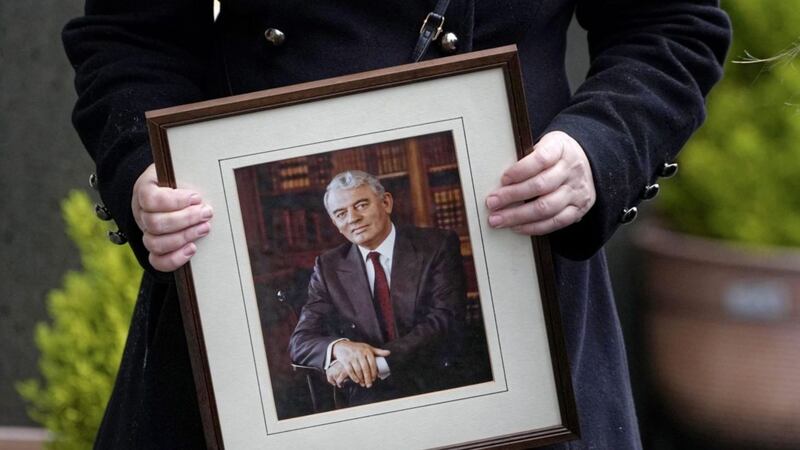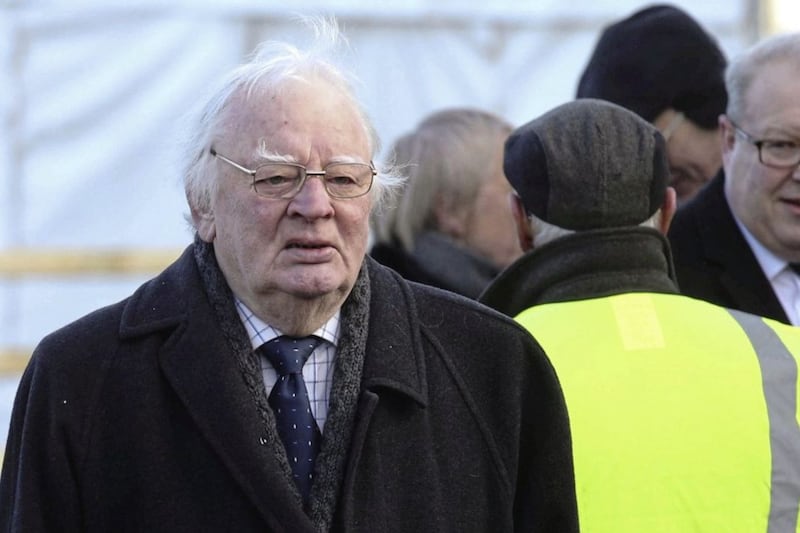ONE night in May 1989, after a meeting of the Coalisland branch of the SDLP, Austin Currie made a phone call to Garret FitzGerald, who had been trying to contact him earlier.
The first words of the former taoiseach were: “How would you like to stand for a safe seat in the Dáil?”
It was a stagnant period in northern politics and, after consulting family members, Currie accepted the offer. In the general election a month later, he was elected as a Fine Gael TD for Dublin West.
So far so good. The following year, he was asked to become the party’s candidate in the election for President of Ireland. In his autobiography entitled ‘All Hell Will Break Loose’ (The O’Brien Press, 2004) he writes that his initial response was completely negative: indeed he laughed out loud. But eventually he was persuaded to let his name go forward. The other two candidates were Brian Lenihan Sr of Fianna Fáil and Labour Party nominee Mary Robinson.
Voting was scheduled for November 7 and a fortnight beforehand I was assigned to follow his campaign on the ground and write daily reports. The first location was Waterford and Austin arrived in dramatic fashion by helicopter from Ballinasloe. In the course of the day, I followed him from Waterford to Dungarvan, Cappoquin, Clonmel and Cahir as well as other places. A Fine Gael party worker remarked: “You would need a pair of roller-skates to keep up with him.”
Next day he was canvassing in the Dublin district of Tallaght with the Fine Gael leader at the time, Alan Dukes. A day later again, I was on the same flight as Austin to Farranfore airport in Co Kerry. Fianna Fáil rival Brian Lenihan was in serious trouble over allegations that he had made a phone call in 1982 to then-President Patrick Hillery, seeking to persuade the head of state to refrain from exercising his authority to dissolve the Dáil for a general election, which didn’t suit Fianna Fáil at the time.
Currie was back in Dublin 24 hours later for a fundraising lunch at £100 a plate. Then it was on to Navan, Co Meath, where he got a warm reception except for a woman who said: “Go back to the north, go back where you came from.” Austin reacted with amusement on that occasion although this type of provincialism did give him cause for concern.
Next day he headed off to Limerick. An audiotape was played on the radio in which Lenihan had told a postgraduate researcher in May 1990 that he did indeed phone President Hillery. Currie said there were implications for then-Taoiseach Charles Haughey who had also allegedly made a phone call. I included his comments in my daily report for The Irish Times.
As I recall, we fetched up at a late stage in Listowel where a torch-lit Fine Gael street rally was taking place. It was now well past my deadline and space was tight, so I took the opportunity to spend time in the company of the legendary playwright and author of ‘The Field’, John B. Keane, which to me was the equivalent of meeting Shakespeare in Stratford-upon-Avon. Austin told me afterwards that, in my position, he would have done the same thing, but he later expressed some understandable disappointment.
In our last conversation prior to the election, Currie told me he expected to get more first preference votes than Robinson, whose transfers could then help him win the contest. In the event, Robinson got 39 per cent on the first count, five points behind her Fianna Fáil rival but well ahead of Austin at 17 per cent and, thanks to his preferences, she overcame Lenihan to become Ireland’s first woman president.
Aspects of Austin Currie’s political career mentioned in the aftermath of his recent passing included the dreadful physical threats and violence he and his family faced over the years, involving more than 30 attacks on their home from different quarters. Their courage was inspiring. It was some time since I last met him and it would have been interesting to hear his views on the Sinn Féin surge in opinion polls south of the border. No doubt he would have combined acute observation with a touch of humour.
When the late Rodney Rice of RTÉ was reporting on his 1990 presidential campaign, Austin introduced the pair of them to a voter in a shopping centre as follows: “We’re Currie and Rice.”
Email: Ddebre1@aol.com; Twitter: @DdeBreadun








